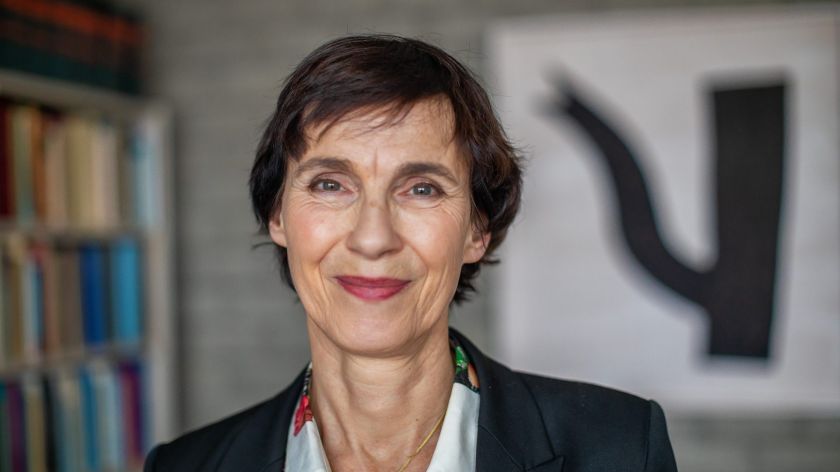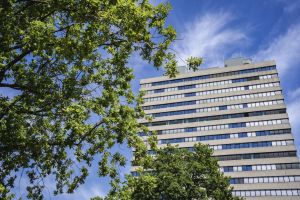New Dean Faculty of Arts doesn’t want people to work themselves into a frenzy
-
 Paula Fikkert. Foto: Dick van Aalst
Paula Fikkert. Foto: Dick van Aalst
Teams that divide educational and research tasks amongst themselves; that is the perfect world for Paula Fikkert, the new dean for the Faculty of Arts. She also advocates for maintaining the smaller language studies in Nijmegen. ‘Those are part and parcel for an arts faculty.’
By her own admission, Paula Fikkert would not have thought that a quarter century ago, she would still be working in Nijmegen today. ‘It seems I like it here’, says the professor of First Language Acquisition and Phonology in her office on the thirteenth floor of the Erasmus building.
Fikkert studied in Groningen, and acquired her PhD in Leiden. Before starting in Nijmegen, she worked for five years in the German city of Konstanz. For a while, she was also a guest lecturer at Oxford. ‘But Nijmegen has always been my home.’
Job listing
Starting March 1st, Fikkert is the dean of the faculty where she has worked for the past 25 years. Before that, she was, among other things, the chair for the university-wide committee Recognition & Rewards. ‘I would love to implement the ideas we gathered at the faculty. I believe that I have the experience by now.’
You are a professor at the Dutch department; how well do you know the rest of the faculty?
‘As a former director of research, I am naturally very familiar with the Centre for Language Studies and the other language departments; I also hosted many lectures in the Language and Communication department. Because I’ve been around for so long, I now quite a lot of people at the other departments. The only department I am less familiar with is the Radboud Institute for Culture and History, but I’m sure that will change quickly.’
You landed in a house that is somewhat out of order: the faculty of arts is without a director of operations.
‘We recently closed the job listing, and we will soon start talks with the various candidates. For now, the director’s tasks will be handled by various other people. That does mean that some employees have more to do, but I hope that we will have the faculty back up to its full strength soon. There’s no need to worry about anything going wrong.’
What about finances? The Nijmegen School of Management has some major issues in that area.
We’re doing well, financially speaking. There are some challenges coming up, but they’re nothing to worry about; not even now that we are temporarily without a head of finances.’
What can you tell me about the construction plans for the new Arts building at the site of the current Spinoza building, which are set to be completed in 2027?
‘As far as I’m aware, everything is going according to schedule. We have a lot of say when it comes to the workspaces, and we’re using the Maria Montessori building as an example. Firstly, they were all going to be flex spaces, but that is no longer the case. Some people will end up working in flex spaces but that should be fine.’
A year ago, there was some consternation regarding the smaller language studies. The Sector Plan Languages stated that too few students chose a language study, which means that there is an increasing shortage of teachers of French and German. This negatively impacts the quality of education, which in turn leads to fewer applicants: it is a vicious cycle. Should the French and German studies become part of a national program? And if so, what about the Dutch study program?
The Sector Plans, in which universities make agreements on what to do moving forward, are intended to improve matters; there is extra money involved. Anything we do, should be seen from that perspective. We don’t need to set up a joint education with other universities for the Dutch department. We can bring students from different universities together for interesting projects, but there needs to be some added value.’
‘The French and German studies will have to cooperate on a national level’
‘Given the lack of students, the French and German studies are neither financially nor qualitatively feasible at the moment; they will have to cooperate on a national level. We are currently investigating how to cooperate in a constructive manner without losing our own identity.’
Do the profiles of the Nijmegen courses in French and German need to be reinvented?
‘No, we are using our own strengths; we’re looking for the best solution for both faculty and students alike. However, it is likely that the number of offered courses will be more limited.’
Are study programs with only a handful of students still viable?
‘That is a fair question to ask, but we have an obligation to society to train and maintain teachers. A faculty of Arts without its languages is no longer a faculty of arts. That is my vision, but in Groningen, for example, the languages have become part of European Studies. I don’t think we’ll follow suit, but we will be forming broader programs, potentially with more attention to languages.’
Does this mean that, in the future, students of French and German will need to travel across the country?
‘We are looking for an option that will not mandate additional travel, except in cases where students want to follow a lot of courses in French or German. We don’t want students to waste a lot of time travelling, of course; that’s not what they’ve chosen for. But if a program has only one or two first-year students, it might be fun to meet other students elsewhere in the country.’
When are the Sector Plans due to be completed?
‘The deadline for the plans is in 2027, so we still have some time left. It’s important to carefully weigh our options. We want to offer an attractive program, strengthened by joint activities.’
And another thing: you are the former chair for the Recognition & Rewards committee. How do you intend to use this expertise in the Faculty of Arts?
‘I would love to organise pilots concerning team-based science. In my perfect world, a team would divide the various educational and research tasks amongst themselves. That would allow us to better employ the various talents on offer.’
How do you intend to do this, concretely?
‘Say you have a large group of people, where one person wants to do more research for a year due to a large scholarship application. In that case, another person could spend more time teaching. The same holds true for societal impact or leadership: some people absolutely love it, others do not. No one has to do everything; as long as the team performs well.’

‘One of the pillars of Recognition & Rewards is that we want to create more space for people’s individual talents. Of course, everyone still has to do both research and teaching, but the exact amounts can vary from year to year. If, at one point, you don’t have the inspiration to do research, you can teach more. The main thing is that people can use their talents, and that the work remains interesting and challenging.’
Career perspective is another part of Recognition & Rewards. A lot of people at the university feel that assistant professor is the end point of their career.
‘Sadly, there are limited positions for associate professors or full professors. Even if someone has all the necessary qualifications, it is not a guarantee. But we should make sure that there are plenty of challenges and possibilities for personal growth. If someone who is not a full professor mentors a PhD candidate, they should be appropriately compensated.
Do you feel that assistant- and associate professors should have the right to promote PhD candidates?
‘That is already the case for associate professors under certain circumstances, but we haven’t discussed this for assistant professors. However, there are universities that are experimenting with that. I don’t think it should be a general rule, but it should be a possibility for someone with the right qualities.’
How do you feel about the experiments in Utrecht, Leiden, and Amsterdam, where the opposition is allowed to wear a toga during PhD defences, based on the principle that the quality of their questions should be considered equal?
‘If you are asked to judge a thesis, it would be silly if your expertise were not recognised. I think it’s a wonderful gesture.’
Is that something you’ll advocate for with the Council of Deans?
‘I think we need to take a closer look. Sometimes, people are assistant professors despite them having the qualities of an associate professor. I think that that should be recognised, for instance by wearing a toga at PhD defences.’
The last few years have seen various initiatives intended to lower workload. Have those had an effect?
‘One of the main goals of the Sector Plans was to lower the workload. We were partially successful; there are now a lot more assistant professors. That means that the overall workload has decreased, but that doesn’t mean that people feel the same way.’
How can you explain that?
‘Looking at myself: I was always too busy. Not just because there was so much to do, but also because I was a driven researcher who saw new research possibilities everywhere. That can be rather taxing.’
‘There are a lot of scientists who work too much’
‘Scientists are very driven. Very few of them work too little; a lot of them work too much. That is, in part, a consequence of the lack of job openings. I hope to reach a point where we don’t go crazy working.’
How do you hope to get that message through to the faculty?
‘Changes in culture are often quite slow. We have to make sure we arrive at work in a fit and clear-minded state and not to work ourselves into a frenzy. I aim to set the right example, but I’m not there yet. Busy periods on occasion are not a bad thing, but at the same time, you should be able to go for a walk without a million other things to do. It’s something of a mental adjustment as well.’
‘The main thing is that I want people to enjoy working here: they shouldn’t become ill from the workload, and the environment should feel safe. I hope that that is something we can accomplish.’
Translated by Jasper Pesch.



